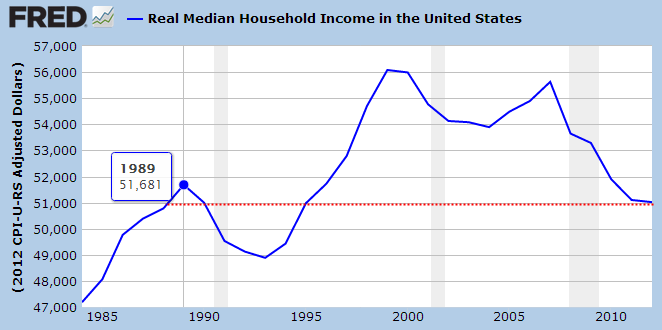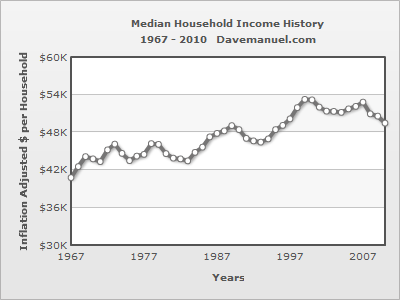Everyone talks about the GOP's ridiculous field, and rightfully so. But, too few talk about Sanders' nutty rants, unsubstantiated claims and severe misunderstanding of how things work in this country.
NYT graciously allowed for what I consider one of the worst Op-Eds I have ever read:
http://www.nytimes.com/2015/12/23/opinion/bernie-sanders-to-rein-in-wall-street-fix-the-fed.html
I have decided to dissect some of Sanders' statements. If only someone could debate him on these points.
To rein in Wall Street, we should begin by reforming the Federal Reserve, which oversees financial institutions and which uses monetary policy to maintain price stability and full employment.
Notice only the latter two are part of the Fed's mandate.
The recent decision by the Fed to raise interest rates is the latest example of the rigged economic system.
Big bankers and their supporters in Congress have been telling us for years that runaway inflation is just around the corner.
Who specifically is he referring to? Is he confusing Big Bankers with
@IU1 and his cult following of ZeroHedge and Peter Schiff?
What went wrong at the Fed? The chief executives of some of the largest banks in America are allowed to serve on its boards. During the Wall Street crisis of 2007, Jamie Dimon, the chief executive and chairman of JPMorgan Chase, served on the New York Fed’s board of directors while his bank received more than $390 billion in financial assistance from the Fed. Next year, four of the 12 presidents at the regional Federal Reserve Banks will be former executives from one firm: Goldman Sachs.
Who understands the financial sector better than those working in the financial sector? Does he understand what a BOD even is?
Board members should be nominated by the president and chosen by the Senate. Banking industry executives must no longer be allowed to serve on the Fed’s boards and to handpick its members and staff.
So, Sanders wants to politicize one of the few independent institutions left in this country? To this I just laugh.Talk about self-serving. He is advocating for more corruption, he just doesn't know it. Perhaps he needs to be reminded how well the SCOTUS nomination procedures work. I'm sure he is a huge fan of Scalia and Thomas and feels they were rightly appointed.
Moreover, it makes you wonder who he would appoint to oversee such a complex area of the economy. We all know how effective lifetime public officials are (see the incompetence of the SEC).
The Fed must also make sure that financial institutions are investing in the productive economy by providing affordable loans to small businesses and consumers that create good jobs.
WTF? Is this a serious statement? Does he remember what the role of the Fed is as previously stated at the top of his own bloggish editorial?
1) He is essentially advocating for the Government to mandate how private institutions lend money. How very communist of him. Perhaps he never read all of the stories of failure with the SBA, USDA, etc.
2) Providing affordable loans to riskier businesses goes against the risk-taking that he proposes in this publication! It goes against Dodd-Frank, the pile of legal restrictions and regulations that Sanders supported.
How? First, we should prohibit commercial banks from gambling with the bank deposits of the American people
Um... the Volcker Rule, part of the D-F bill Bernie voted for, is already in effect. On top of that Basel requirements are more stringent.
Second, the Fed must stop providing incentives for banks to keep money out of the economy. Since 2008, the Fed has been paying financial institutions interest on excess reserves parked at the central bank — reserves that have grown to an unprecedented $2.4 trillion.
What? Does he understand what excess capital requirements means? This is part of the regulation that Bernie voted for.
T
hird, as a condition of receiving financial assistance from the Fed, large banks must commit to increasing lending to creditworthy small businesses and consumers, reducing credit card interest rates and fees, and providing help to underwater and struggling homeowners.
What the hell is wrong with this guy? This is exactly the type of lending that caused the financial recession and the type of behavior that Bernie himself is ridiculing. Now he wants the banks to make risky loans to those that shouldn't be allowed to get credit? Just makes you wonder if he has an IQ above 100.
We also need transparency. Too much of the Fed’s business is conducted in secret, known only to the bankers on its various boards and committees. Full and unredacted transcripts of the Federal Open Market Committee must be released to the public within six months, not five years, which is the custom now.
Unless I am missing something, FOMC minutes are provided within weeks after the meetings, not 5 years. Did he even bother to check these? Don't even answer that question.
http://www.federalreserve.gov/monetarypolicy/fomccalendars.htm
We must reinstate Glass-Steagall and break up the too-big-to-fail financial institutions that threaten our economy.
So would he repeal D-F since there are substantial amounts of overlap? Also, did someone inform Bernie that Bear and Lehman were investment banks only and G-S would have had zero impact on their failure?
In sum, it's pretty sad that this guy has so much support and that the ignorant American public and media (thanks NYT) doesn't even bother to fact check the rhetoric they want to hear. Just goes to show you that it isn't just the far right that has nutjobs and endangers the country.







